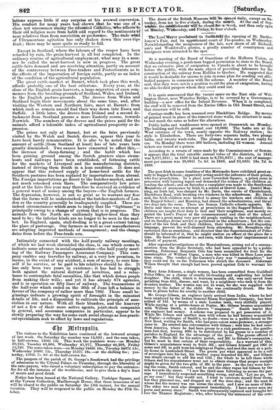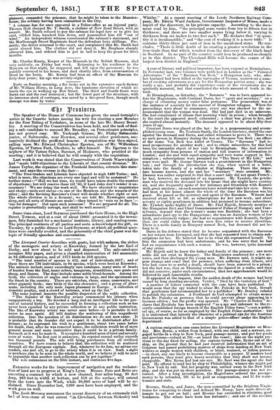tht
The visitors to the Exhibition have continued at the lowered average of last week. On Saturday the number was 13,052; and the sum taken, in half-crowns, 1806/. 15s. This week the numbers were—on Monday 50,233, Tuesday 49,866, Wednesday 41,917, Thursday 44,209, Friday 15,726. The sums taken were—on Monday 24651. 10s., Tuesday 24071. 15s., Wednesday 20801. 12s., Thursday 21371. 18s.—at the shilling fee; yes- terday, 15931. 78. 6d. at the half-crown fee.
The paupers of the parish of St. George's Southwark had the privilege of admission to the Crystal Palace on Thursday, through the liberality of the rate-payers, who raised a voluntary subscription to pay the entrance- fee for all the inmates of the workhouse, and to give them a day's feast of meats and good drink.
Notice has been issued at the National Gallery, Trafalgar Square, and at the :Vernon Collection, Marlborough House, that those museums of art will be closed to the public on Saturday the 13th instant, for the annual vacation. They will be reopened to the public on Monday the 27th Oc- tober. The doors of the British Museum Will 'be opened daily, except on Se- tiuday, from ten to five o'clock, during the Meath. At the end of Sep..
tee** the. rut viillbe closed for a o'week, and then only open otiMisiday, 9Vbnesd4, fuhiFriday, to four o'clock.
'IlteLordifinfor proclaim/1d sin Smithfield the .Aapemng of St. Bartho- lomew's Fair, and its app'nitenant court of Pie-poudre, on Wednesday. Notwithstanding the meagreness of the fair, now shorn of all Iiichara. son's and Wombwell's glories, a goodly number of countrymen and foreigners were attracted to the spot.
At a meeting of the Board of Guardians of the Holborn 'Union on Wednesday evening, a gentleman begged permission to state to the BOted, that an extensive plan of emigration to Canada is about to be brought before the public, with the main object of providing labourers for the construction of the railway from Halifax to Quebec. He suggested that it would be desirable for unions to join in some plan for sending out able- bodied paupers in connexion with the scheme. A member of the Board said, that they were not in a position to aid the plan of emigration, having no able-bo died paupers whom they could send out.
It is again announced that the vacant space en the East side of Wel- lington Street, near Waterloo Bridge, is to be covered by a Government building—a new office for the Inland Revenue. When it is completed, the staff will be removed from the Excise Office in Old Broad Street, and that structure will be sold.
Carriage-traffic has been resumed over Blackfriars Bridge. By means of painted wood in place of the removed stone walls, the structure is made to look much the same as before the alterations.
Public baths and vtashhouses were opened at Greenwich on Monday. The building and freehold ground cost 10,0001. The baths are at the West entrance of the town, nearly opposite the Railway station ; the style is Elizabethan. There are forty-two separate baths, two plunge baths, and twenty wash-tubs. The plunge baths are not yet ready for use. On Monday there were 366 bathers, including 22 women. Annual tickets are issued at a guinea.
According to a return of rates made by the Commissioners of Sewers, it appears that the total rateable annual value of the districts, in 1849, was 8,077,5911.; in 1850 it had risen to 8;791,9571.; the cost of manage- ment per annum was 20,005/. 7s. Gd. in 1849, and 23,4651. 18s. 74. in 1860.
The poor Irish in some localities of the Metropolis -have exhibited great en- mity to Ragged Schools ; apparently actingunder the influence of their priests, who fear proselytism. In a place near Cavendish Square, a priest came in procession with burning tapers and demanded the names of the children at- tending the school; and on Saturday a complaint was made to the Southwark Magistrate of annoyance by Irish to a school at Gravel Lane. Daniel Man- ming, an Irish lad, was charged by Mr. Davis, the curate of Christchurch, Blackfriars Road, with breaking two windows in the schoolroom. Mr. Davis said, the Irish children were incited to annoy the teachers and children of the Ragged School ; and Manning, had abused the schoolmistress, and thrust two dogs into the room. There are Roman Catholic schools opposite. Mr. Davis said there was no attempt at jwoaelytisin in the Ragged School : the
children are taught their duty to and their neighbour, and merely re- pealed the Lord's Prayer at the commencement and close of the school. There are a great many very poor old people residing in the neighbourhood, and on Sundays divine service is performed in the schoolroom ; but the con- duct of the low Irish and their children, their intimidation and disgusting language, prevent the well-disposed from attending. Mr. Broughton cha- racterized this as scandalous, and directed that the Superintendent of Police should be informed of it, that he might station an officer at the place for a time. He fined the prisoner 3s. and costs, with three days' imprisonment in default of payment.
After repeated investigations at the blansionhouse, arising out of a commu- nication from the Home Secretary, who had been appealed to by a public meeting, Policeman Benjamin Celebes been committed for trial for the manslaughter of William Cogan' a man who was killed in Shoe Lane some time since. The verdict of the Coroner's Jury -was "manslaughter," but they could not fix on the Policeman who struck the deceased. Alderman Wilson thought that enough had been proved against Cole to warrant his trial.
Mary Anne Johnson, a single woman, has been committed from Guildhall Police Office, on a charge of cruelly ill-treating and neglecting her infant daughter. The child, which is fourteen months old, was only saved from penshing from filth, -disease, and want, by a neighbour-who took it from the drunken mother. The woman was not an want, for she was supplied with money by the father of the child. She was continually drunk. She has been in prison before for cruelty to another child.
Mr. George Gibson, an engineer lately arrived from India, where he had been employed by the Indian General Steam Navigation Company, has been robbed of 153 . by means of a stale London trick, very skilfully played. While staving at a public-house at Poplar, Mr. Gibson hecaine acquainted with William Smith, a well-known " magsman." Smith learnt that the engineer had money. A scheme was prepared to get possession of it. While Mr. Gibson and another man with whom he had become acquainted at Poplar—a colleague of Smith's, no doubt—were in a public-house in the New Road, waiting for Smith, who had gone out on some pretence, a stranger came in. He entered into conversation with Gibson ; told him he had come from America, where he had been groom to a rich gentleman; the gentle- man had died, leaving 4001. to be distributed by his groom to a number of parishes in England for the advantage of the poor. The groom offered to give Mr. Gibson 201. for his native parish, and 201. to Gibson's companion ; but he must be first certain of their respectability. As a warrant of this, Gibson's acquaintance went to fetch 501.; and Gibson himself got 100/. in notes and 531. in geld from his lodgings at Poplar, and met the ,men at a pub- lic-house in Leadenhall Street. The groom put what appeared to be a roll of sovereigns into his hat, his brother rogue deposited his 501., and Gibson was simple enough to add his real 1531.; the whole to be left there while Gibson and his acquaintance went out to obtain stamps that proper receipts might be given for the two gifts of 201. to the poor. As the two were leav- ing the room, Smith entered, and he and the other rogue led Gibson by the arm towards the street. "I saw the third man following us across the pas- sage. I immediately suspected something wrong, and said, Let me go, let go my arm! ' but they would not. I tned to extricate myself from them, but they pinioned me, and dragged me off the door-step; and the man in whose luit the money was ran across the street, and I saw no more of him. The other two men also disappeared immediately. I have never seen my purse and money since." Smith was subsequently captured and brought be- fore the Thames Magistrate ; who, after hearing the statement of the com- remanded the prisoner, that he might be taken to:the Mansion- rotaut,tie robbery having been committed in the City.
A cabman-has for once appeared in a Police-office as an injured. party. Thomas Holt charged Mr. T. Smith, a clothier of New Bond Street, with an assault. Mr. Smith refused to pay the cabman his legal fare or to give his card, vilified him, knocked him down, and pummelled him till "out of -wind." An • independent witness corroborated the cabman's statement, and the Marlborough--StreetMagistrate fined the defendant forty shillings. Pre- sently, the-driver returned to the court, and complained that Mr. Smith had again abused him. The clothier did not deny it. Mr. Bingham sharply censured him, and ordered him to put in bad to -keep the peace for three months.
Mr. Charles Ktenig, Keeper of the Minerals in the British Museum, died very suddenly, on Friday -last week. Returning to his residence in the Museum on that night, he staggered and fell upon the pavement; he was quickly conveyed to his house, and died shortly after, from extravasation of blood on the brain. Mr. Kceetig, had been an officer of the Museum for forty-four years; his age was seventy-eight.
Early on Sunday morning, a fire broke out in the extensive coach-factory of Mr. William Home, in Long Acre, the handsome elevation of which at- tracts the eye in walking up 'Bow Street. The third and fourth floors were burnt out and the roof destroyed; but the lower part of the structure, with its immense stoek of carriages, was saved by a fire-proof floor, though much damage was done by water.



























 Previous page
Previous page